NSB303 - Colorectal Cancer: Partnership in Health and Illness Essay
VerifiedAdded on 2023/01/19
|10
|2715
|84
Essay
AI Summary
This essay provides a detailed analysis of a colorectal cancer case study, focusing on the development and importance of a survivorship care plan. It explores the diagnosis and treatment options for colorectal cancer, including surgical interventions and the use of CEA tests. The essay further examines collaborative approaches to patient education and self-management, addressing physical, psychological, social, and spiritual issues faced by patients. It emphasizes the role of health education and effective communication principles in improving patient outcomes and promoting adherence to treatment plans. The discussion includes strategies for health education, communication, and the importance of patient-doctor partnerships in providing comprehensive care. The essay integrates evidence-based models of health behavior change and highlights strategies for promoting positive health behaviors, ultimately contributing to improved patient outcomes and quality of life.

Running head: PARTNERSHIP IN HEALTH AND ILLNESS 1
Partnership in Health and Illness
Student’s Name
Institutional Affiliation
Partnership in Health and Illness
Student’s Name
Institutional Affiliation
Paraphrase This Document
Need a fresh take? Get an instant paraphrase of this document with our AI Paraphraser
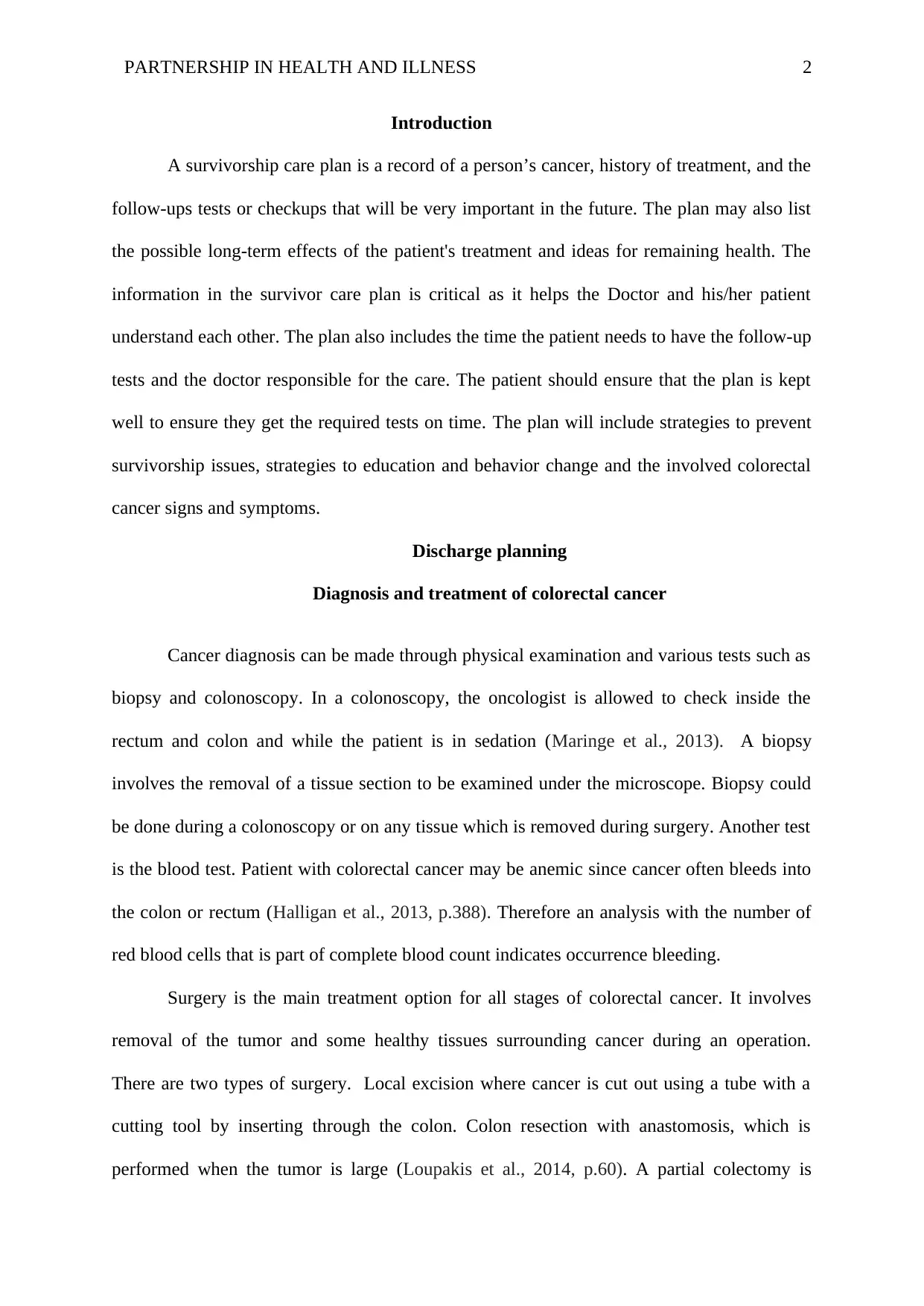
PARTNERSHIP IN HEALTH AND ILLNESS 2
Introduction
A survivorship care plan is a record of a person’s cancer, history of treatment, and the
follow-ups tests or checkups that will be very important in the future. The plan may also list
the possible long-term effects of the patient's treatment and ideas for remaining health. The
information in the survivor care plan is critical as it helps the Doctor and his/her patient
understand each other. The plan also includes the time the patient needs to have the follow-up
tests and the doctor responsible for the care. The patient should ensure that the plan is kept
well to ensure they get the required tests on time. The plan will include strategies to prevent
survivorship issues, strategies to education and behavior change and the involved colorectal
cancer signs and symptoms.
Discharge planning
Diagnosis and treatment of colorectal cancer
Cancer diagnosis can be made through physical examination and various tests such as
biopsy and colonoscopy. In a colonoscopy, the oncologist is allowed to check inside the
rectum and colon and while the patient is in sedation (Maringe et al., 2013). A biopsy
involves the removal of a tissue section to be examined under the microscope. Biopsy could
be done during a colonoscopy or on any tissue which is removed during surgery. Another test
is the blood test. Patient with colorectal cancer may be anemic since cancer often bleeds into
the colon or rectum (Halligan et al., 2013, p.388). Therefore an analysis with the number of
red blood cells that is part of complete blood count indicates occurrence bleeding.
Surgery is the main treatment option for all stages of colorectal cancer. It involves
removal of the tumor and some healthy tissues surrounding cancer during an operation.
There are two types of surgery. Local excision where cancer is cut out using a tube with a
cutting tool by inserting through the colon. Colon resection with anastomosis, which is
performed when the tumor is large (Loupakis et al., 2014, p.60). A partial colectomy is
Introduction
A survivorship care plan is a record of a person’s cancer, history of treatment, and the
follow-ups tests or checkups that will be very important in the future. The plan may also list
the possible long-term effects of the patient's treatment and ideas for remaining health. The
information in the survivor care plan is critical as it helps the Doctor and his/her patient
understand each other. The plan also includes the time the patient needs to have the follow-up
tests and the doctor responsible for the care. The patient should ensure that the plan is kept
well to ensure they get the required tests on time. The plan will include strategies to prevent
survivorship issues, strategies to education and behavior change and the involved colorectal
cancer signs and symptoms.
Discharge planning
Diagnosis and treatment of colorectal cancer
Cancer diagnosis can be made through physical examination and various tests such as
biopsy and colonoscopy. In a colonoscopy, the oncologist is allowed to check inside the
rectum and colon and while the patient is in sedation (Maringe et al., 2013). A biopsy
involves the removal of a tissue section to be examined under the microscope. Biopsy could
be done during a colonoscopy or on any tissue which is removed during surgery. Another test
is the blood test. Patient with colorectal cancer may be anemic since cancer often bleeds into
the colon or rectum (Halligan et al., 2013, p.388). Therefore an analysis with the number of
red blood cells that is part of complete blood count indicates occurrence bleeding.
Surgery is the main treatment option for all stages of colorectal cancer. It involves
removal of the tumor and some healthy tissues surrounding cancer during an operation.
There are two types of surgery. Local excision where cancer is cut out using a tube with a
cutting tool by inserting through the colon. Colon resection with anastomosis, which is
performed when the tumor is large (Loupakis et al., 2014, p.60). A partial colectomy is
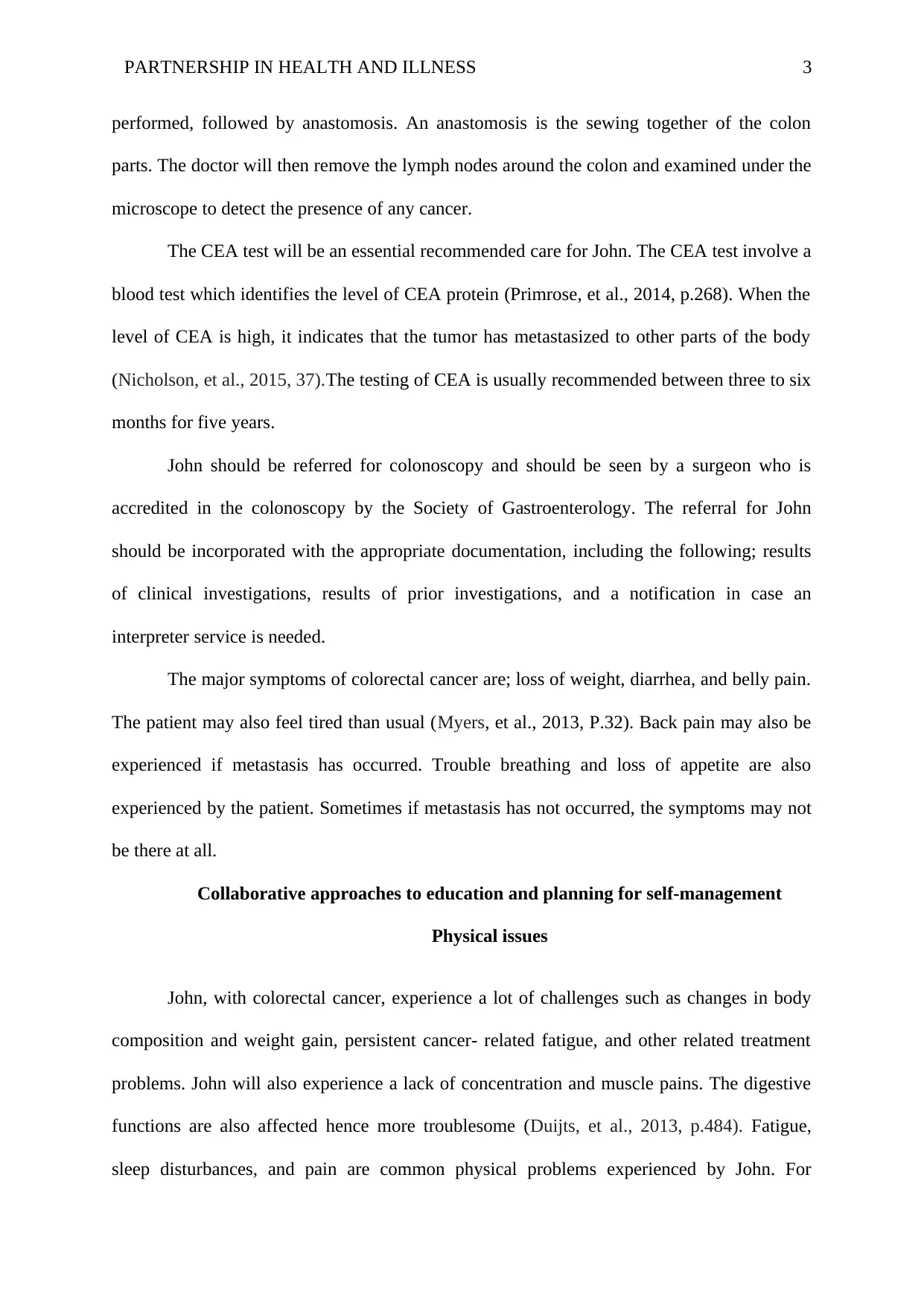
PARTNERSHIP IN HEALTH AND ILLNESS 3
performed, followed by anastomosis. An anastomosis is the sewing together of the colon
parts. The doctor will then remove the lymph nodes around the colon and examined under the
microscope to detect the presence of any cancer.
The CEA test will be an essential recommended care for John. The CEA test involve a
blood test which identifies the level of CEA protein (Primrose, et al., 2014, p.268). When the
level of CEA is high, it indicates that the tumor has metastasized to other parts of the body
(Nicholson, et al., 2015, 37).The testing of CEA is usually recommended between three to six
months for five years.
John should be referred for colonoscopy and should be seen by a surgeon who is
accredited in the colonoscopy by the Society of Gastroenterology. The referral for John
should be incorporated with the appropriate documentation, including the following; results
of clinical investigations, results of prior investigations, and a notification in case an
interpreter service is needed.
The major symptoms of colorectal cancer are; loss of weight, diarrhea, and belly pain.
The patient may also feel tired than usual (Myers, et al., 2013, P.32). Back pain may also be
experienced if metastasis has occurred. Trouble breathing and loss of appetite are also
experienced by the patient. Sometimes if metastasis has not occurred, the symptoms may not
be there at all.
Collaborative approaches to education and planning for self-management
Physical issues
John, with colorectal cancer, experience a lot of challenges such as changes in body
composition and weight gain, persistent cancer- related fatigue, and other related treatment
problems. John will also experience a lack of concentration and muscle pains. The digestive
functions are also affected hence more troublesome (Duijts, et al., 2013, p.484). Fatigue,
sleep disturbances, and pain are common physical problems experienced by John. For
performed, followed by anastomosis. An anastomosis is the sewing together of the colon
parts. The doctor will then remove the lymph nodes around the colon and examined under the
microscope to detect the presence of any cancer.
The CEA test will be an essential recommended care for John. The CEA test involve a
blood test which identifies the level of CEA protein (Primrose, et al., 2014, p.268). When the
level of CEA is high, it indicates that the tumor has metastasized to other parts of the body
(Nicholson, et al., 2015, 37).The testing of CEA is usually recommended between three to six
months for five years.
John should be referred for colonoscopy and should be seen by a surgeon who is
accredited in the colonoscopy by the Society of Gastroenterology. The referral for John
should be incorporated with the appropriate documentation, including the following; results
of clinical investigations, results of prior investigations, and a notification in case an
interpreter service is needed.
The major symptoms of colorectal cancer are; loss of weight, diarrhea, and belly pain.
The patient may also feel tired than usual (Myers, et al., 2013, P.32). Back pain may also be
experienced if metastasis has occurred. Trouble breathing and loss of appetite are also
experienced by the patient. Sometimes if metastasis has not occurred, the symptoms may not
be there at all.
Collaborative approaches to education and planning for self-management
Physical issues
John, with colorectal cancer, experience a lot of challenges such as changes in body
composition and weight gain, persistent cancer- related fatigue, and other related treatment
problems. John will also experience a lack of concentration and muscle pains. The digestive
functions are also affected hence more troublesome (Duijts, et al., 2013, p.484). Fatigue,
sleep disturbances, and pain are common physical problems experienced by John. For
⊘ This is a preview!⊘
Do you want full access?
Subscribe today to unlock all pages.

Trusted by 1+ million students worldwide
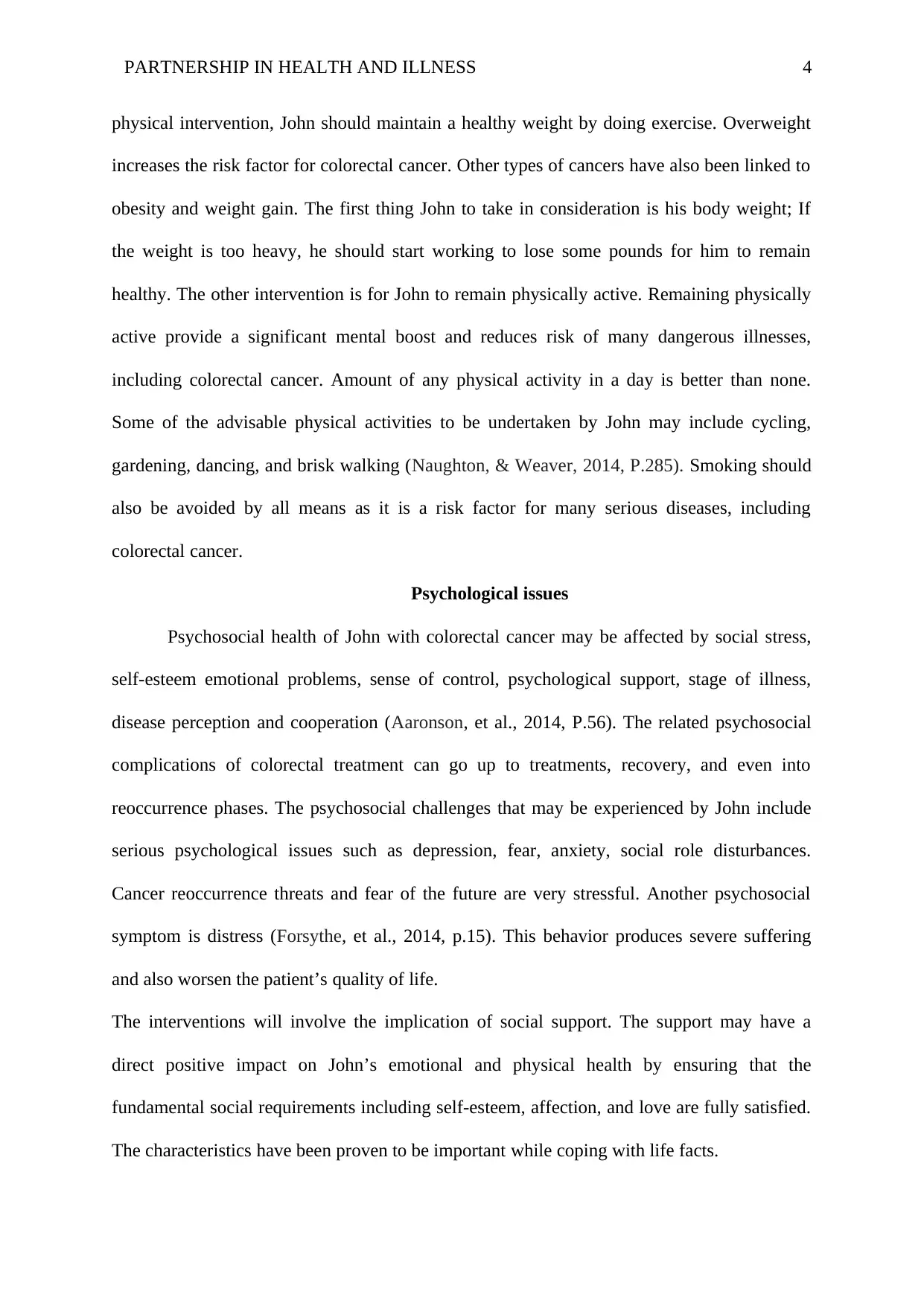
PARTNERSHIP IN HEALTH AND ILLNESS 4
physical intervention, John should maintain a healthy weight by doing exercise. Overweight
increases the risk factor for colorectal cancer. Other types of cancers have also been linked to
obesity and weight gain. The first thing John to take in consideration is his body weight; If
the weight is too heavy, he should start working to lose some pounds for him to remain
healthy. The other intervention is for John to remain physically active. Remaining physically
active provide a significant mental boost and reduces risk of many dangerous illnesses,
including colorectal cancer. Amount of any physical activity in a day is better than none.
Some of the advisable physical activities to be undertaken by John may include cycling,
gardening, dancing, and brisk walking (Naughton, & Weaver, 2014, P.285). Smoking should
also be avoided by all means as it is a risk factor for many serious diseases, including
colorectal cancer.
Psychological issues
Psychosocial health of John with colorectal cancer may be affected by social stress,
self-esteem emotional problems, sense of control, psychological support, stage of illness,
disease perception and cooperation (Aaronson, et al., 2014, P.56). The related psychosocial
complications of colorectal treatment can go up to treatments, recovery, and even into
reoccurrence phases. The psychosocial challenges that may be experienced by John include
serious psychological issues such as depression, fear, anxiety, social role disturbances.
Cancer reoccurrence threats and fear of the future are very stressful. Another psychosocial
symptom is distress (Forsythe, et al., 2014, p.15). This behavior produces severe suffering
and also worsen the patient’s quality of life.
The interventions will involve the implication of social support. The support may have a
direct positive impact on John’s emotional and physical health by ensuring that the
fundamental social requirements including self-esteem, affection, and love are fully satisfied.
The characteristics have been proven to be important while coping with life facts.
physical intervention, John should maintain a healthy weight by doing exercise. Overweight
increases the risk factor for colorectal cancer. Other types of cancers have also been linked to
obesity and weight gain. The first thing John to take in consideration is his body weight; If
the weight is too heavy, he should start working to lose some pounds for him to remain
healthy. The other intervention is for John to remain physically active. Remaining physically
active provide a significant mental boost and reduces risk of many dangerous illnesses,
including colorectal cancer. Amount of any physical activity in a day is better than none.
Some of the advisable physical activities to be undertaken by John may include cycling,
gardening, dancing, and brisk walking (Naughton, & Weaver, 2014, P.285). Smoking should
also be avoided by all means as it is a risk factor for many serious diseases, including
colorectal cancer.
Psychological issues
Psychosocial health of John with colorectal cancer may be affected by social stress,
self-esteem emotional problems, sense of control, psychological support, stage of illness,
disease perception and cooperation (Aaronson, et al., 2014, P.56). The related psychosocial
complications of colorectal treatment can go up to treatments, recovery, and even into
reoccurrence phases. The psychosocial challenges that may be experienced by John include
serious psychological issues such as depression, fear, anxiety, social role disturbances.
Cancer reoccurrence threats and fear of the future are very stressful. Another psychosocial
symptom is distress (Forsythe, et al., 2014, p.15). This behavior produces severe suffering
and also worsen the patient’s quality of life.
The interventions will involve the implication of social support. The support may have a
direct positive impact on John’s emotional and physical health by ensuring that the
fundamental social requirements including self-esteem, affection, and love are fully satisfied.
The characteristics have been proven to be important while coping with life facts.
Paraphrase This Document
Need a fresh take? Get an instant paraphrase of this document with our AI Paraphraser
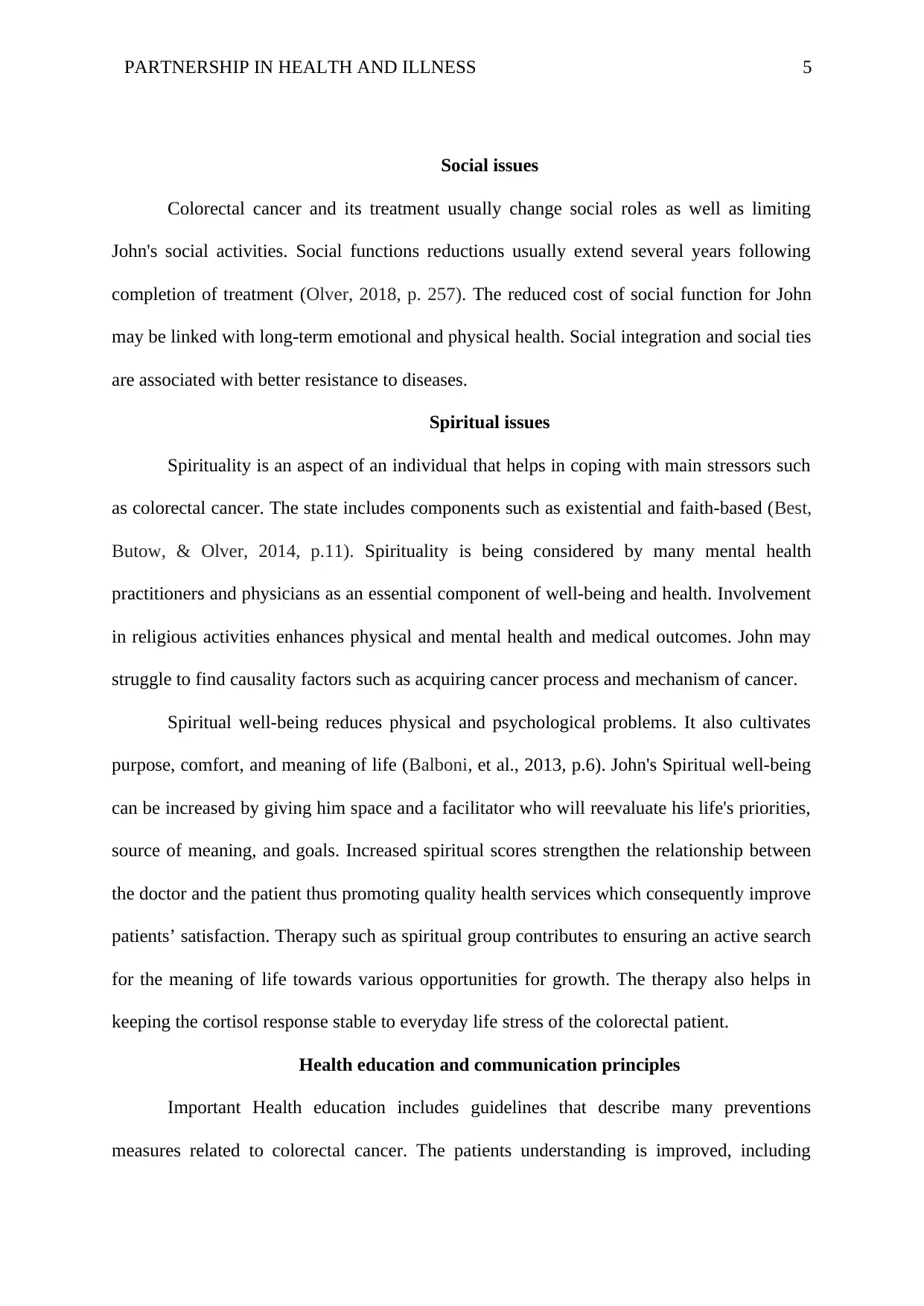
PARTNERSHIP IN HEALTH AND ILLNESS 5
Social issues
Colorectal cancer and its treatment usually change social roles as well as limiting
John's social activities. Social functions reductions usually extend several years following
completion of treatment (Olver, 2018, p. 257). The reduced cost of social function for John
may be linked with long-term emotional and physical health. Social integration and social ties
are associated with better resistance to diseases.
Spiritual issues
Spirituality is an aspect of an individual that helps in coping with main stressors such
as colorectal cancer. The state includes components such as existential and faith-based (Best,
Butow, & Olver, 2014, p.11). Spirituality is being considered by many mental health
practitioners and physicians as an essential component of well-being and health. Involvement
in religious activities enhances physical and mental health and medical outcomes. John may
struggle to find causality factors such as acquiring cancer process and mechanism of cancer.
Spiritual well-being reduces physical and psychological problems. It also cultivates
purpose, comfort, and meaning of life (Balboni, et al., 2013, p.6). John's Spiritual well-being
can be increased by giving him space and a facilitator who will reevaluate his life's priorities,
source of meaning, and goals. Increased spiritual scores strengthen the relationship between
the doctor and the patient thus promoting quality health services which consequently improve
patients’ satisfaction. Therapy such as spiritual group contributes to ensuring an active search
for the meaning of life towards various opportunities for growth. The therapy also helps in
keeping the cortisol response stable to everyday life stress of the colorectal patient.
Health education and communication principles
Important Health education includes guidelines that describe many preventions
measures related to colorectal cancer. The patients understanding is improved, including
Social issues
Colorectal cancer and its treatment usually change social roles as well as limiting
John's social activities. Social functions reductions usually extend several years following
completion of treatment (Olver, 2018, p. 257). The reduced cost of social function for John
may be linked with long-term emotional and physical health. Social integration and social ties
are associated with better resistance to diseases.
Spiritual issues
Spirituality is an aspect of an individual that helps in coping with main stressors such
as colorectal cancer. The state includes components such as existential and faith-based (Best,
Butow, & Olver, 2014, p.11). Spirituality is being considered by many mental health
practitioners and physicians as an essential component of well-being and health. Involvement
in religious activities enhances physical and mental health and medical outcomes. John may
struggle to find causality factors such as acquiring cancer process and mechanism of cancer.
Spiritual well-being reduces physical and psychological problems. It also cultivates
purpose, comfort, and meaning of life (Balboni, et al., 2013, p.6). John's Spiritual well-being
can be increased by giving him space and a facilitator who will reevaluate his life's priorities,
source of meaning, and goals. Increased spiritual scores strengthen the relationship between
the doctor and the patient thus promoting quality health services which consequently improve
patients’ satisfaction. Therapy such as spiritual group contributes to ensuring an active search
for the meaning of life towards various opportunities for growth. The therapy also helps in
keeping the cortisol response stable to everyday life stress of the colorectal patient.
Health education and communication principles
Important Health education includes guidelines that describe many preventions
measures related to colorectal cancer. The patients understanding is improved, including
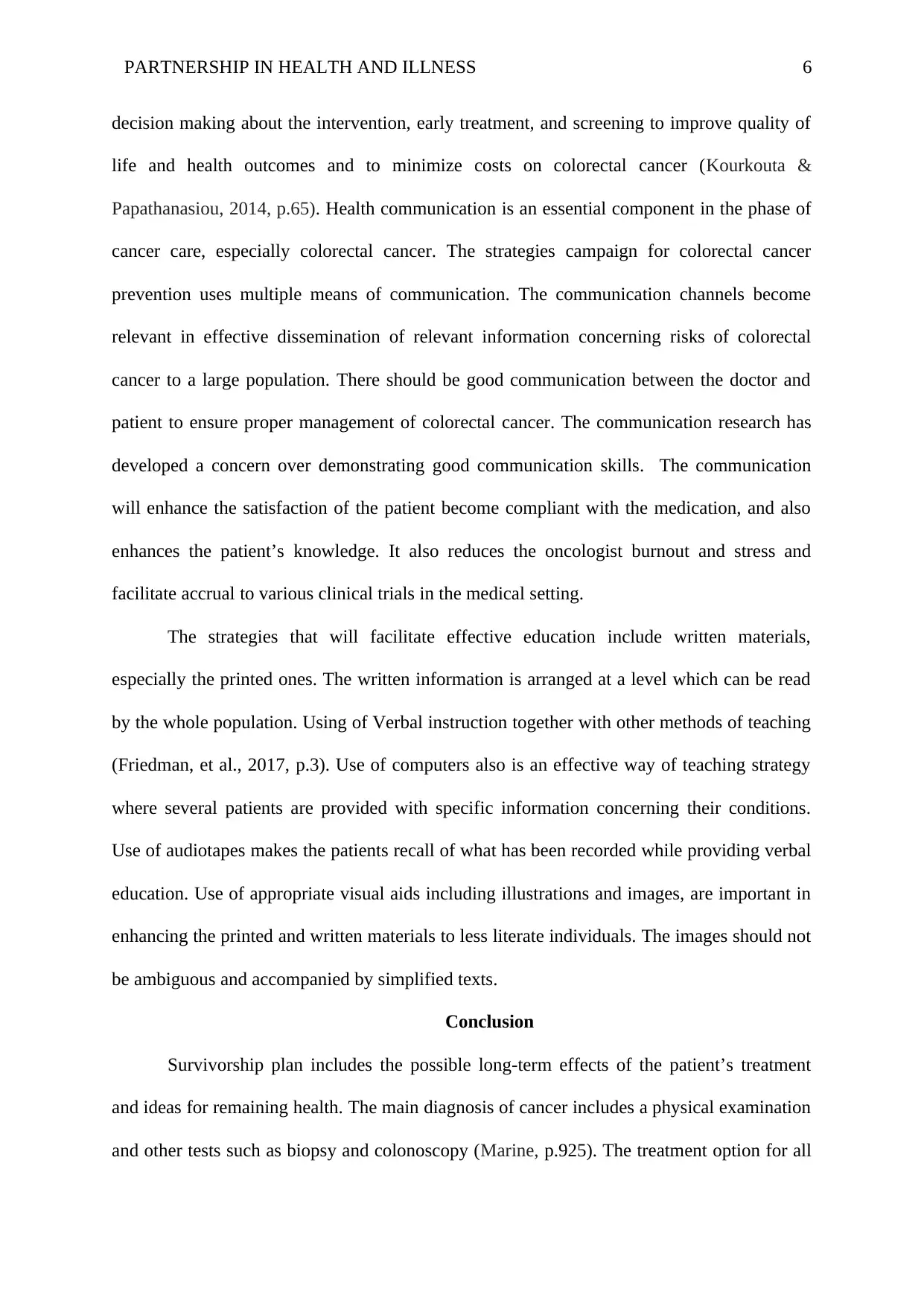
PARTNERSHIP IN HEALTH AND ILLNESS 6
decision making about the intervention, early treatment, and screening to improve quality of
life and health outcomes and to minimize costs on colorectal cancer (Kourkouta &
Papathanasiou, 2014, p.65). Health communication is an essential component in the phase of
cancer care, especially colorectal cancer. The strategies campaign for colorectal cancer
prevention uses multiple means of communication. The communication channels become
relevant in effective dissemination of relevant information concerning risks of colorectal
cancer to a large population. There should be good communication between the doctor and
patient to ensure proper management of colorectal cancer. The communication research has
developed a concern over demonstrating good communication skills. The communication
will enhance the satisfaction of the patient become compliant with the medication, and also
enhances the patient’s knowledge. It also reduces the oncologist burnout and stress and
facilitate accrual to various clinical trials in the medical setting.
The strategies that will facilitate effective education include written materials,
especially the printed ones. The written information is arranged at a level which can be read
by the whole population. Using of Verbal instruction together with other methods of teaching
(Friedman, et al., 2017, p.3). Use of computers also is an effective way of teaching strategy
where several patients are provided with specific information concerning their conditions.
Use of audiotapes makes the patients recall of what has been recorded while providing verbal
education. Use of appropriate visual aids including illustrations and images, are important in
enhancing the printed and written materials to less literate individuals. The images should not
be ambiguous and accompanied by simplified texts.
Conclusion
Survivorship plan includes the possible long-term effects of the patient’s treatment
and ideas for remaining health. The main diagnosis of cancer includes a physical examination
and other tests such as biopsy and colonoscopy (Marine, p.925). The treatment option for all
decision making about the intervention, early treatment, and screening to improve quality of
life and health outcomes and to minimize costs on colorectal cancer (Kourkouta &
Papathanasiou, 2014, p.65). Health communication is an essential component in the phase of
cancer care, especially colorectal cancer. The strategies campaign for colorectal cancer
prevention uses multiple means of communication. The communication channels become
relevant in effective dissemination of relevant information concerning risks of colorectal
cancer to a large population. There should be good communication between the doctor and
patient to ensure proper management of colorectal cancer. The communication research has
developed a concern over demonstrating good communication skills. The communication
will enhance the satisfaction of the patient become compliant with the medication, and also
enhances the patient’s knowledge. It also reduces the oncologist burnout and stress and
facilitate accrual to various clinical trials in the medical setting.
The strategies that will facilitate effective education include written materials,
especially the printed ones. The written information is arranged at a level which can be read
by the whole population. Using of Verbal instruction together with other methods of teaching
(Friedman, et al., 2017, p.3). Use of computers also is an effective way of teaching strategy
where several patients are provided with specific information concerning their conditions.
Use of audiotapes makes the patients recall of what has been recorded while providing verbal
education. Use of appropriate visual aids including illustrations and images, are important in
enhancing the printed and written materials to less literate individuals. The images should not
be ambiguous and accompanied by simplified texts.
Conclusion
Survivorship plan includes the possible long-term effects of the patient’s treatment
and ideas for remaining health. The main diagnosis of cancer includes a physical examination
and other tests such as biopsy and colonoscopy (Marine, p.925). The treatment option for all
⊘ This is a preview!⊘
Do you want full access?
Subscribe today to unlock all pages.

Trusted by 1+ million students worldwide

PARTNERSHIP IN HEALTH AND ILLNESS 7
stages of colorectal cancer through performing of surgery, which can be local excision and
colon resection. In Collaborative approaches to education and planning for self-management
that can be experienced by survivor, patient include physical, social, psychosocial, and
spiritual problems. Health education and communication principles contribute to a significant
role in managing and prevention of colorectal cancer.
stages of colorectal cancer through performing of surgery, which can be local excision and
colon resection. In Collaborative approaches to education and planning for self-management
that can be experienced by survivor, patient include physical, social, psychosocial, and
spiritual problems. Health education and communication principles contribute to a significant
role in managing and prevention of colorectal cancer.
Paraphrase This Document
Need a fresh take? Get an instant paraphrase of this document with our AI Paraphraser

PARTNERSHIP IN HEALTH AND ILLNESS 8
References
Aaronson, N. K., Mattioli, V., Minton, O., Weis, J., Johansen, C., Dalton, S. O., ... & de
Boer, A. (2014). Beyond treatment–Psychosocial and behavioral issues in cancer
survivorship research and practice. European Journal of Cancer Supplements, 12(1),
54-64.
Balboni, T. A., Balboni, M., Enzinger, A. C., Gallivan, K., Paulk, M. E., Wright, A., ... &
Prigerson, H. G. (2013). Provision of spiritual support to patients with advanced
cancer by religious communities and associations with medical care at the end of
life. JAMA internal medicine, 173(12), 1109-1117.
Best, M., Butow, P., & Olver, I. (2014). Spiritual support of cancer patients and the role of
the doctor. Supportive Care in Cancer, 22(5), 1333-1339.
Duijts, S. F., van Egmond, M. P., Spelten, E., van Muijen, P., Anema, J. R., & van der Beek,
A. J. (2014). Physical and psychosocial problems in cancer survivors beyond return to
work: a systematic review. Psycho‐Oncology, 23(5), 481-492.
Forsythe, L. P., Kent, E. E., Weaver, K. E., Buchanan, N., Hawkins, N. A., Rodriguez, J.
L., ... & Rowland, J. H. (2013). Receipt of psychosocial care among cancer survivors
in the United States. Journal of Clinical Oncology, 31(16), 1961.
Friedman, R. Cosby, S. Boyko, J. Hatton-Bauer, G. Turnbull, (2017). Effective Teaching
Strategies and Methods of Delivery for Patient Education. [Online]. Retrieved from:
https://www.cancercareontario.ca/en/content/effective-teaching-strategies-and-
methods-patient-education
Halligan, S., Wooldridge, K., Dadswell, E., Kralj-Hans, I., Von Wagner, C., Edwards, R., ...
& Teare, J. (2013). Computed tomographic colonography versus barium enema for
References
Aaronson, N. K., Mattioli, V., Minton, O., Weis, J., Johansen, C., Dalton, S. O., ... & de
Boer, A. (2014). Beyond treatment–Psychosocial and behavioral issues in cancer
survivorship research and practice. European Journal of Cancer Supplements, 12(1),
54-64.
Balboni, T. A., Balboni, M., Enzinger, A. C., Gallivan, K., Paulk, M. E., Wright, A., ... &
Prigerson, H. G. (2013). Provision of spiritual support to patients with advanced
cancer by religious communities and associations with medical care at the end of
life. JAMA internal medicine, 173(12), 1109-1117.
Best, M., Butow, P., & Olver, I. (2014). Spiritual support of cancer patients and the role of
the doctor. Supportive Care in Cancer, 22(5), 1333-1339.
Duijts, S. F., van Egmond, M. P., Spelten, E., van Muijen, P., Anema, J. R., & van der Beek,
A. J. (2014). Physical and psychosocial problems in cancer survivors beyond return to
work: a systematic review. Psycho‐Oncology, 23(5), 481-492.
Forsythe, L. P., Kent, E. E., Weaver, K. E., Buchanan, N., Hawkins, N. A., Rodriguez, J.
L., ... & Rowland, J. H. (2013). Receipt of psychosocial care among cancer survivors
in the United States. Journal of Clinical Oncology, 31(16), 1961.
Friedman, R. Cosby, S. Boyko, J. Hatton-Bauer, G. Turnbull, (2017). Effective Teaching
Strategies and Methods of Delivery for Patient Education. [Online]. Retrieved from:
https://www.cancercareontario.ca/en/content/effective-teaching-strategies-and-
methods-patient-education
Halligan, S., Wooldridge, K., Dadswell, E., Kralj-Hans, I., Von Wagner, C., Edwards, R., ...
& Teare, J. (2013). Computed tomographic colonography versus barium enema for
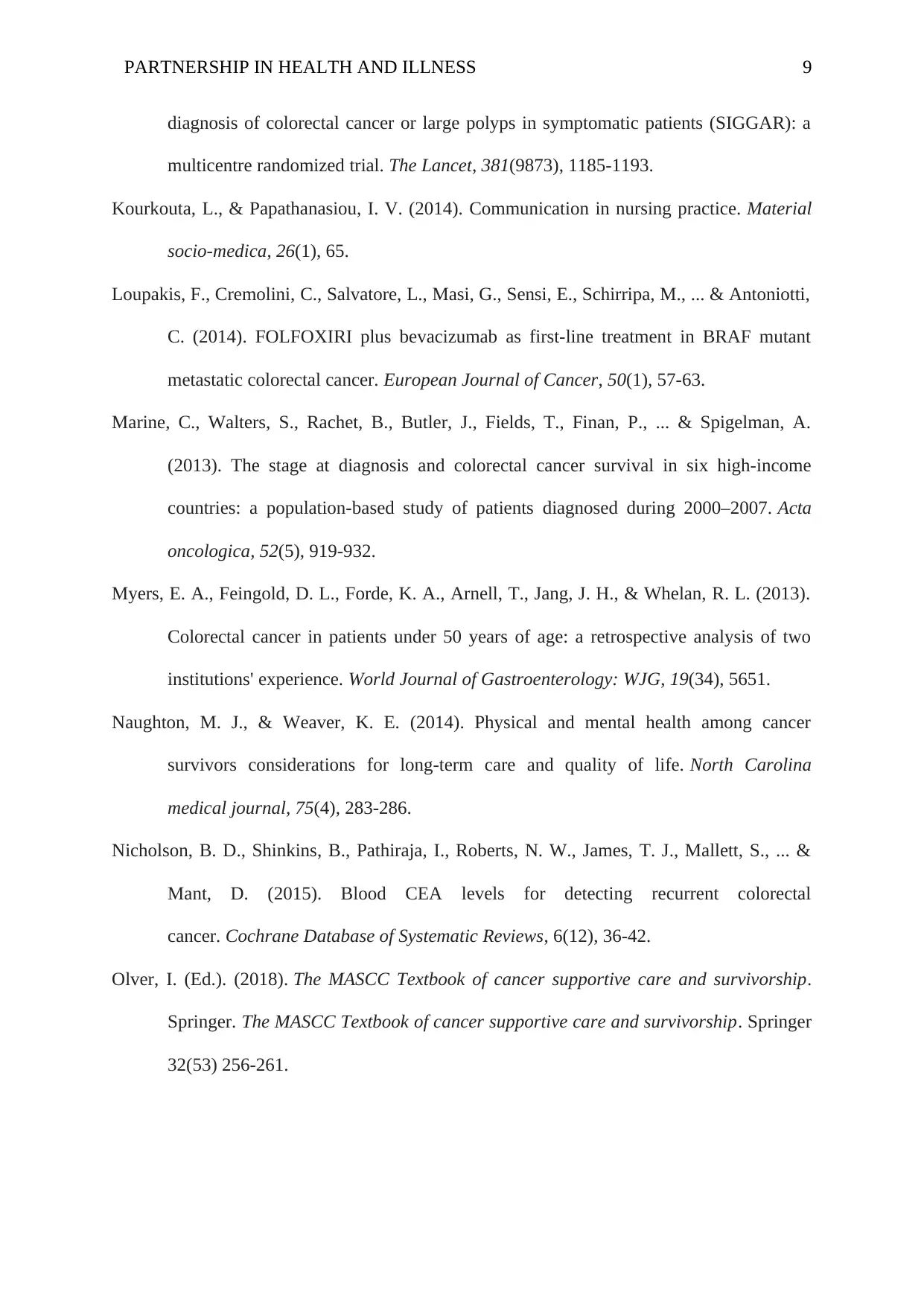
PARTNERSHIP IN HEALTH AND ILLNESS 9
diagnosis of colorectal cancer or large polyps in symptomatic patients (SIGGAR): a
multicentre randomized trial. The Lancet, 381(9873), 1185-1193.
Kourkouta, L., & Papathanasiou, I. V. (2014). Communication in nursing practice. Material
socio-medica, 26(1), 65.
Loupakis, F., Cremolini, C., Salvatore, L., Masi, G., Sensi, E., Schirripa, M., ... & Antoniotti,
C. (2014). FOLFOXIRI plus bevacizumab as first-line treatment in BRAF mutant
metastatic colorectal cancer. European Journal of Cancer, 50(1), 57-63.
Marine, C., Walters, S., Rachet, B., Butler, J., Fields, T., Finan, P., ... & Spigelman, A.
(2013). The stage at diagnosis and colorectal cancer survival in six high-income
countries: a population-based study of patients diagnosed during 2000–2007. Acta
oncologica, 52(5), 919-932.
Myers, E. A., Feingold, D. L., Forde, K. A., Arnell, T., Jang, J. H., & Whelan, R. L. (2013).
Colorectal cancer in patients under 50 years of age: a retrospective analysis of two
institutions' experience. World Journal of Gastroenterology: WJG, 19(34), 5651.
Naughton, M. J., & Weaver, K. E. (2014). Physical and mental health among cancer
survivors considerations for long-term care and quality of life. North Carolina
medical journal, 75(4), 283-286.
Nicholson, B. D., Shinkins, B., Pathiraja, I., Roberts, N. W., James, T. J., Mallett, S., ... &
Mant, D. (2015). Blood CEA levels for detecting recurrent colorectal
cancer. Cochrane Database of Systematic Reviews, 6(12), 36-42.
Olver, I. (Ed.). (2018). The MASCC Textbook of cancer supportive care and survivorship.
Springer. The MASCC Textbook of cancer supportive care and survivorship. Springer
32(53) 256-261.
diagnosis of colorectal cancer or large polyps in symptomatic patients (SIGGAR): a
multicentre randomized trial. The Lancet, 381(9873), 1185-1193.
Kourkouta, L., & Papathanasiou, I. V. (2014). Communication in nursing practice. Material
socio-medica, 26(1), 65.
Loupakis, F., Cremolini, C., Salvatore, L., Masi, G., Sensi, E., Schirripa, M., ... & Antoniotti,
C. (2014). FOLFOXIRI plus bevacizumab as first-line treatment in BRAF mutant
metastatic colorectal cancer. European Journal of Cancer, 50(1), 57-63.
Marine, C., Walters, S., Rachet, B., Butler, J., Fields, T., Finan, P., ... & Spigelman, A.
(2013). The stage at diagnosis and colorectal cancer survival in six high-income
countries: a population-based study of patients diagnosed during 2000–2007. Acta
oncologica, 52(5), 919-932.
Myers, E. A., Feingold, D. L., Forde, K. A., Arnell, T., Jang, J. H., & Whelan, R. L. (2013).
Colorectal cancer in patients under 50 years of age: a retrospective analysis of two
institutions' experience. World Journal of Gastroenterology: WJG, 19(34), 5651.
Naughton, M. J., & Weaver, K. E. (2014). Physical and mental health among cancer
survivors considerations for long-term care and quality of life. North Carolina
medical journal, 75(4), 283-286.
Nicholson, B. D., Shinkins, B., Pathiraja, I., Roberts, N. W., James, T. J., Mallett, S., ... &
Mant, D. (2015). Blood CEA levels for detecting recurrent colorectal
cancer. Cochrane Database of Systematic Reviews, 6(12), 36-42.
Olver, I. (Ed.). (2018). The MASCC Textbook of cancer supportive care and survivorship.
Springer. The MASCC Textbook of cancer supportive care and survivorship. Springer
32(53) 256-261.
⊘ This is a preview!⊘
Do you want full access?
Subscribe today to unlock all pages.

Trusted by 1+ million students worldwide

PARTNERSHIP IN HEALTH AND ILLNESS 10
Primrose, J. N., Perera, R., Gray, A., Rose, P., Fuller, A., Corkhill, A., ... & Mant, D. (2014).
Effect of 3 to 5 years of scheduled CEA and CT follow-up to detect recurrence of
colorectal cancer: the FACS randomized clinical trial. Jama, 311(3), 263-270.
Primrose, J. N., Perera, R., Gray, A., Rose, P., Fuller, A., Corkhill, A., ... & Mant, D. (2014).
Effect of 3 to 5 years of scheduled CEA and CT follow-up to detect recurrence of
colorectal cancer: the FACS randomized clinical trial. Jama, 311(3), 263-270.
1 out of 10
Related Documents
Your All-in-One AI-Powered Toolkit for Academic Success.
+13062052269
info@desklib.com
Available 24*7 on WhatsApp / Email
![[object Object]](/_next/static/media/star-bottom.7253800d.svg)
Unlock your academic potential
Copyright © 2020–2026 A2Z Services. All Rights Reserved. Developed and managed by ZUCOL.





